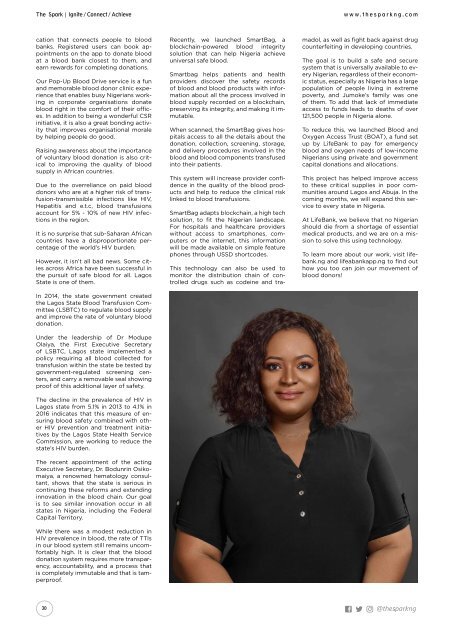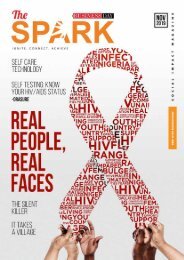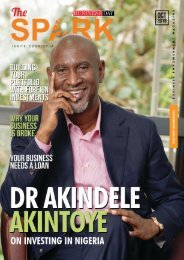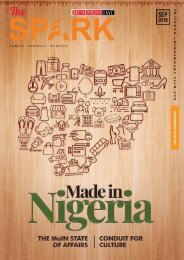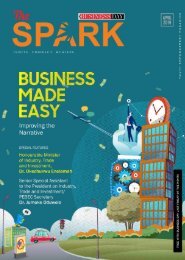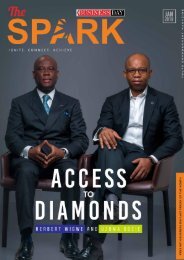The Tech Vantage
Create successful ePaper yourself
Turn your PDF publications into a flip-book with our unique Google optimized e-Paper software.
<strong>The</strong> Spark | Ignite / Connect / Achieve<br />
www . the sparkng.co m<br />
cation that connects people to blood<br />
banks. Registered users can book appointments<br />
on the app to donate blood<br />
at a blood bank closest to them, and<br />
earn rewards for completing donations.<br />
Our Pop-Up Blood Drive service is a fun<br />
and memorable blood donor clinic experience<br />
that enables busy Nigerians working<br />
in corporate organisations donate<br />
-<br />
es. In addition to being a wonderful CSR<br />
initiative, it is also a great bonding activity<br />
that improves organisational morale<br />
by helping people do good.<br />
Raising awareness about the importance<br />
of voluntary blood donation is also critical<br />
to improving the quality of blood<br />
supply in African countries.<br />
Due to the overreliance on paid blood<br />
donors who are at a higher risk of transfusion-transmissible<br />
infections like HIV,<br />
Hepatitis and e.t.c, blood transfusions<br />
account for 5% - 10% of new HIV infections<br />
in the region.<br />
It is no surprise that sub-Saharan African<br />
countries have a disproportionate percentage<br />
of the world’s HIV burden.<br />
However, it isn’t all bad news. Some cities<br />
across Africa have been successful in<br />
the pursuit of safe blood for all. Lagos<br />
State is one of them.<br />
In 2014, the state government created<br />
the Lagos State Blood Transfusion Committee<br />
(LSBTC) to regulate blood supply<br />
and improve the rate of voluntary blood<br />
donation.<br />
Under the leadership of Dr Modupe<br />
Olaiya, the First Executive Secretary<br />
of LSBTC, Lagos state implemented a<br />
policy requiring all blood collected for<br />
transfusion within the state be tested by<br />
government-regulated screening centers,<br />
and carry a removable seal showing<br />
proof of this additional layer of safety.<br />
<strong>The</strong> decline in the prevalence of HIV in<br />
Lagos state from 5.1% in 2013 to 4.1% in<br />
2016 indicates that this measure of ensuring<br />
blood safety combined with other<br />
HIV prevention and treatment initiatives<br />
by the Lagos State Health Service<br />
Commission, are working to reduce the<br />
state’s HIV burden.<br />
<strong>The</strong> recent appointment of the acting<br />
Executive Secretary, Dr. Bodunrin Osikomaiya,<br />
a renowned hematology consultant,<br />
shows that the state is serious in<br />
continuing these reforms and extending<br />
innovation in the blood chain. Our goal<br />
is to see similar innovation occur in all<br />
states in Nigeria, including the Federal<br />
Capital Territory.<br />
While there was a modest reduction in<br />
HIV prevalence in blood, the rate of TTIs<br />
in our blood system still remains uncomfortably<br />
high. It is clear that the blood<br />
donation system requires more transparency,<br />
accountability, and a process that<br />
is completely immutable and that is tamperproof.<br />
Recently, we launched SmartBag, a<br />
blockchain-powered blood integrity<br />
solution that can help Nigeria achieve<br />
universal safe blood.<br />
Smartbag helps patients and health<br />
providers discover the safety records<br />
of blood and blood products with information<br />
about all the process involved in<br />
blood supply recorded on a blockchain,<br />
preserving its integrity, and making it immutable.<br />
When scanned, the SmartBag gives hospitals<br />
access to all the details about the<br />
donation, collection, screening, storage,<br />
and delivery procedures involved in the<br />
blood and blood components transfused<br />
into their patients.<br />
This system will increase provider confidence<br />
in the quality of the blood products<br />
and help to reduce the clinical risk<br />
linked to blood transfusions.<br />
SmartBag adapts blockchain, a high tech<br />
solution, to fit the Nigerian landscape.<br />
For hospitals and healthcare providers<br />
without access to smartphones, computers<br />
or the internet, this information<br />
will be made available on simple feature<br />
phones through USSD shortcodes.<br />
This technology can also be used to<br />
monitor the distribution chain of controlled<br />
drugs such as codeine and tramadol,<br />
as well as fight back against drug<br />
counterfeiting in developing countries.<br />
<strong>The</strong> goal is to build a safe and secure<br />
system that is universally available to every<br />
Nigerian, regardless of their economic<br />
status, especially as Nigeria has a large<br />
population of people living in extreme<br />
poverty, and Jumoke’s family was one<br />
of them. To add that lack of immediate<br />
access to funds leads to deaths of over<br />
121,500 people in Nigeria alone.<br />
To reduce this, we launched Blood and<br />
Oxygen Access Trust (BOAT), a fund set<br />
up by LifeBank to pay for emergency<br />
blood and oxygen needs of low-income<br />
Nigerians using private and government<br />
capital donations and allocations.<br />
This project has helped improve access<br />
to these critical supplies in poor communities<br />
around Lagos and Abuja. In the<br />
coming months, we will expand this service<br />
to every state in Nigeria.<br />
At LifeBank, we believe that no Nigerian<br />
should die from a shortage of essential<br />
medical products, and we are on a mission<br />
to solve this using technology.<br />
To learn more about our work, visit lifebank.ng<br />
and lifeabankapp.ng to find out<br />
how you too can join our movement of<br />
blood donors!<br />
30 @the<br />
sp<br />
ark<br />
ng


